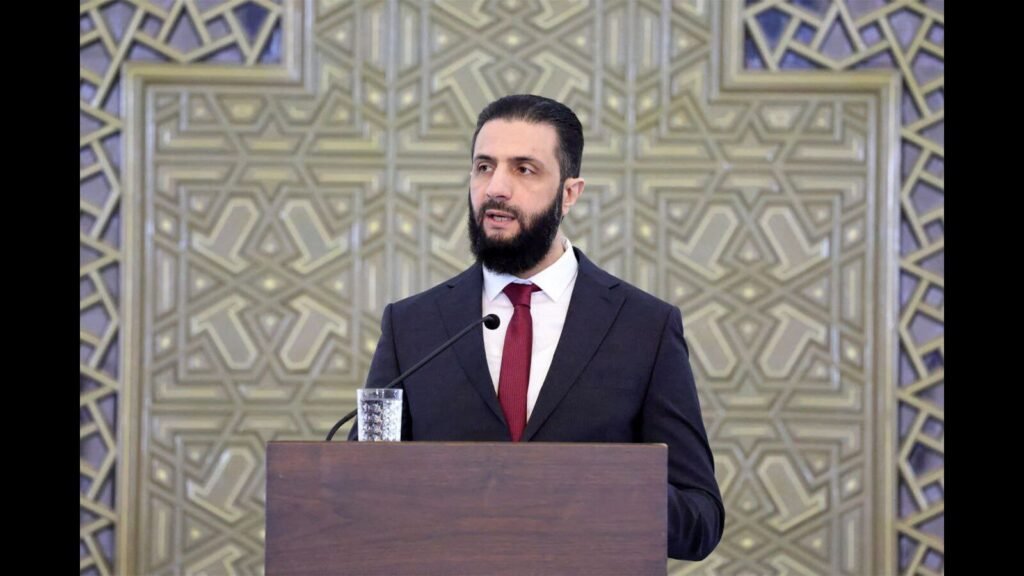
The collapse of the Near 25-Year long reign of now former syrian president Bashar al-hassad was welcomed emphatically by Western Powers. However, Unlike the Demanded Change Via The Arab Spring Across West Asia Years ago, LED by a People’s Revolution, The Unfolding of Power in Damascus Happy AT the Hands of Ahmed Al-Sararaa and the Hay’At Tahrir Al-Sham (HTS), an anti-hatsad militia with roots in both al-qaeda and the islamic state (isis).

Al-sharaa, who previously went by his nom de guerre abu mohammed al-jolani, wasted no time in cementing his authority as the assads fled to russia. Following this change of power, western offices flocked to damascus, as al-sharaa gave up his now former jihadist credentials for a new political reality and lookd to re-brand himself as The Kalashnikovs Gave Way to Crisp Suits and Ties, Welcoming European Foreign Ministers and American Officials, As the Post-9/11 Security Order LED by Washington, DC Since 2001 Fundamentally Unravelled. The united states (US) and the West, after waging wars in Iraq and Afghanistan to Weed out al Qaeda and its Ilk, was dealing with the same entities who no Run Countries.
Hts is not the first such organization to be part of this new normal. The taliban’s takeover of kabul in 2021 set a blueprint in motion. The us, Suffering Political Fatigue With A Rudderless “War on Terror”, Wanted to Exit the Cycle of Counting Terrorism by Way of Massive Massive Military Deployments and Boots on the Grind. This feeling was Mutual Between Republicans and Democrats Alike. However, in syria, it is europe that took charge. Al-Sharaa Benefited from the Fact that European anxiatis over a return of mass migration towards the continent from the Arab Country Again Gave Him Immense Leverage and Access. Europe’s political tilt towards not just the right, but the far right, al aned bot the democratic and liberal order there. A return of Donald Trump in the White House Further Exacerbated Said Anxiatis, Giving Al-Sharaa More Room to Manoeuvre Than he Expected. If al-sharaa, despite his past in al qaeda and isis, could make sure a sense of security and borders can be installed in Syria, the west was open to cooperation.
Afghanistan has been lesson. Unlike al-sharaa, who has made overrses such as not having a fundamental ideological problem with women’s education and for now being the leses the movable Dogmatic, The Taliban Is Much more ingrained in ideological brinkmanship. This is playing out more so within the taliban itself, as the political dispensation under the influence of the haqqqani network in kabul increasing development Emar-al-Mu’MininHibatullah Akhundzada in Kandahar. Comparatively, al-sharaa and hts, for now, have not had internal colpses related to ideological divergences. However, The New Syrian Leader has drawn Ire of other jihadist ideologues over his apparent support for a future democratic election in the country and more liberal definition of islam with Construct. For example, noted jordanian jihadist ideologue abu mohammed al-maqdisi, who supports al-qaeda and the taliban but not isis, have criticized al-sharaa’s “secularist of Sharia, View of Sharia, Blaming Him For turning his back on the bay’a (Allegiance) He Swore to Al Qaeda.
Ultimately, both hts and the taliban have distinct political and ideological realities. Both are also challenged by having to play the game of geopolitics. The western push to engage is in large part also Diminishing the influence of russia and Iran, two countries that proposed up the assad regime over the past decision. The same Russia and Iran, However, Are in Stronger Political Positions with the Taliban as Western Presence in Afghanistan Becomes Negligible.
This unraveling of the post-9/11 order is also seen in Indian policies Grappling with these new realities. While India has cautiously acted its engagement with the taliban, Afghanistan being a neighbourhood state, there have been no such overtures, at least in public, with the hts. New Delhi was a close partner to the assads, looking at their rule as secularist, non-Islamist, and having a common anti-colonial history. This Normalization of Extremist Groups Staking Control of Major States Has Had No Clear Policy Response from Most Countries, Including those those who sem to be engaging at a rapid pace. Today’s engagement in bot afghanistan and syriad are designed Around a revolving door approach, both engagement and disenagement, while avoiding major costs. With such short policy shelf-life, long term security costs remain in the unknown.
Kabir Taneja is Deputy Director and Fellow, Strategic Stodies Program, Observer Research Foundation. The views expressed are personal




